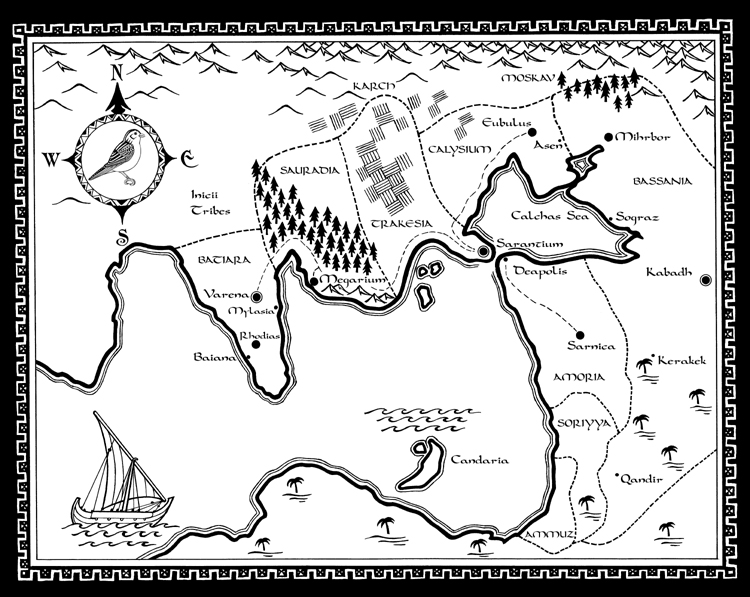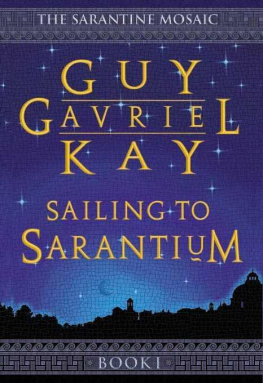Guy Gavriel Kay - Sailing to Sarantium (Sarantine Mosaic, Book 1)
Here you can read online Guy Gavriel Kay - Sailing to Sarantium (Sarantine Mosaic, Book 1) full text of the book (entire story) in english for free. Download pdf and epub, get meaning, cover and reviews about this ebook. year: 1999, publisher: Eos, genre: Detective and thriller. Description of the work, (preface) as well as reviews are available. Best literature library LitArk.com created for fans of good reading and offers a wide selection of genres:
Romance novel
Science fiction
Adventure
Detective
Science
History
Home and family
Prose
Art
Politics
Computer
Non-fiction
Religion
Business
Children
Humor
Choose a favorite category and find really read worthwhile books. Enjoy immersion in the world of imagination, feel the emotions of the characters or learn something new for yourself, make an fascinating discovery.
- Book:Sailing to Sarantium (Sarantine Mosaic, Book 1)
- Author:
- Publisher:Eos
- Genre:
- Year:1999
- Rating:3 / 5
- Favourites:Add to favourites
- Your mark:
- 60
- 1
- 2
- 3
- 4
- 5
Sailing to Sarantium (Sarantine Mosaic, Book 1): summary, description and annotation
We offer to read an annotation, description, summary or preface (depends on what the author of the book "Sailing to Sarantium (Sarantine Mosaic, Book 1)" wrote himself). If you haven't found the necessary information about the book — write in the comments, we will try to find it.
Sailing to Sarantium (Sarantine Mosaic, Book 1) — read online for free the complete book (whole text) full work
Below is the text of the book, divided by pages. System saving the place of the last page read, allows you to conveniently read the book "Sailing to Sarantium (Sarantine Mosaic, Book 1)" online for free, without having to search again every time where you left off. Put a bookmark, and you can go to the page where you finished reading at any time.
Font size:
Interval:
Bookmark:
Sailingto Sarantium
Book 4 ofthe Historical Fantasy Series
By GuyGavriel Kay
For my sons,
Samuel Alexander and Matthew Tyler, with love, as I watch them
'...fashion everything
From nothing every day, and teach
The morning stars to sing.'
I imagine it is obvious from the tide of this work, but I owe a debtof inspiration to William Butler Yeats, whose meditations in poetryand prose on the mysteries of Byzantium led me there and gave me anumber of underlying motifs along with a sense that imagination andhistory would be at home together in this milieu.
I have long believed that to do a variation in fiction upon a givenperiod, one must first try to grasp as much as possible about thatperiod. Byzantium is well served by its historians, fractious as theymight be amongst each other. I have been deeply enlightened andfocused by their writing and-via electronic mail-by personalcommunications and generous encouragement offered by many scholars.It hardly needs to be stressed, I hope, that those people I name herecannot remotely bear any responsibility for errors or deliberatealterations made in what is essentially a fantasy upon themes ofByzantium.
I am happy to record the great assistance I have received from thework of Alan Cameron on chariot racing and the Hippodrome factions;Rossi, Nordhagen, and L'Orange on mosaics; Lionel Casson on travel inthe ancient world; Robert Browning, particularly on Justinian andTheodora; Warren Treadgold on the military; David Talbot Rice,Stephen Runciman,
Gervase Mathew and Ernst Kitzinger on Byzantine aesthetics; and thebroader histories of Cyril Mango, H.W Haussig, Mark Whittow, AverilCameron and G. Ostrogorsky. I should also acknowledge the aid andstimulation I received from participating in the lively and usefullydisputatious scholarly mailing lists on the Internet relating toByzantium and Late Antiquity. My research methods will never be thesame.
On a more personal level, Rex Kay remains my first and mostastringent reader, Martin Springett brought his considerable skillsto preparing the map, and Meg Masters, my Canadian editor, has been acalm, deeply valued presence for four books now. Linda McKnight andAnthea Morton-Saner in Toronto and London are sustaining friends aswell as canny agents, and a sometimes demanding author is deeplyaware of both of these elements. My mother guided me to books as achild and then to the belief I could write my own. She still doesthat. And my wife creates a space into which the words and storiescan come. If I say I am grateful it grievously understates the truth.
... and we knew not whether we were in heaven or on earth. Foron earth there is no such splendour or such beauty, and we were at aloss how to describe it. We know only that God dwells there amongmen, and their service is fairer than the ceremonies of othernations. For we cannot forget that beauty.
-Chronicle of the Journey of Vladimir, Grand Prince of Kiev, toConstantinople

Thunderstorms were common in Sarantium on midsummer nights,sufficiendy so to make plausible the oft-repeated tale that theEmperor Apius passed to the god in the midst of a towering storm,with lightning flashing and rolls of thunder besieging the Holy City.Even Pertennius of Eubulus, writing only twenty years after, told thestory this way, adding a statue of the Emperor toppling before thebronze gates to the Imperial Precinct and an oak tree split asunderjust outside the landward walls. Writers of history often seek thedramatic over the truth. It is a failing of the profession.
In fact, on the night Apius breathed his last in the Porphyry Room ofthe Attenine Palace there was no rain in the City. An occasionalflash of lightning had been seen and one or two growls of thunderheard earlier in the evening, well north of Sarantium, towards thegrainlands of Trakesia. Given the events that followed, that northerndirection might have been seen as portent enough.
The Emperor had no living sons, and his three nephews had ratherspectacularly failed a test of their worthiness less than a yearbefore and had suffered appropriate consequences. There was, as aresult, no Emperor Designate in Sarantium when Apius heard-or did nothear-as the last words of his long life, the inward voice of the godsaying to him alone, 'Uncrown, the Lord of Emperors awaits you now.'
The three men who entered the Porphyry Room in the still-cool hourbefore dawn were each acutely aware of a dangerously unstablesituation. Gesius the eunuch, Chancellor of the Imperial Court,pressed his long, thin fingers together piously, and then kneltstiffly to kiss the dead Emperor's bare feet. So, too, after him, didAdrastus, Master of Offices, who commanded the civil service andadministration, and Valerius, Count of the Excubitors, the ImperialGuard.
'The Senate must be summoned,' murmured Gesius in his papery voice.'They will go into session immediately.'
'Immediately,' agreed Adrastus, fastidiously straightening the collarof his ankle-length tunic as he rose. 'And the Patriarch must beginthe Rites of Mourning.'
'Order,' said Valerius in soldier's tones, 'will be preserved in theCity. I undertake as much.'
The other two looked at him. 'Of course,' said Adrastus, delicately.He smoothed his neat beard. Preserving order was the only reasonValerius had for being in the room just now, one of the first tolearn the lamentable situation. His remarks were ... a shadeemphatic.
The army was primarily east and north at the time, a large elementnear Eubulus on the current Bassanid border, and another, mostlymercenaries, defending the open spaces of Trakesia from the barbarianincursions of the Karchites and the Vrachae, both of whom had beenquiescent of late. The strategos of either military contingent couldbecome a decisive factor-or an Emperor-if the Senate delayed.
The Senate was an ineffectual, dithering body of frightened men. Itwas likely to delay unless given extremely clear guidance. This, too,the three officials in the room with the dead man knew very well.
'I shall,' said Gesius casually, 'make arrangements to have the noblefamilies apprised. They will want to pay their respects.'
'Naturally,' said Adrastus. 'Especially the Daleinoi. I understandFlavius Daleinus returned to the City only two days ago.'
The eunuch was too experienced a man to actually flush.
Valerius had already turned for the doorway. 'Deal with the nobilityas you see fit,' he said over his shoulder. 'But there are fivehundred thousand people in the City who will fear the wrath of HolyJad descending upon a leaderless Empire when they hear of this death.They are my concern. I will send word to the Urban Prefect to readyhis own men. Be thankful there was no thunderstorm in the night.'
He left the room, hard-striding on the mosaic floors,burly-shouldered, still vigorous in his sixtieth year. The other twolooked at each other. Adrastus broke the shared gaze, glancing awayat the dead man in the magnificent bed, and at the jewelled bird onits silver bough beside that bed. Neither man spoke.
Outside the Attenine Palace, Valerius paused in the gardens of theImperial Precinct only long enough to spit into the bushes and notethat it was still some time before the sunrise invocation. The whitemoon was over the water. The dawn wind was west; he could hear thesea, smell salt on the breeze amid the scent of summer flowers andcedars.
He walked away from the water under the late stars, past a jumble ofpalaces and civil service buildings, three small chapels, theImperial Silk Guild's hall and workspaces, the playing fields, thegoldsmiths' workshops, and the absurdly ornate Baths of Marisian,towards the Excubitors' barracks near the bronze gates that led outto the City.
Next pageFont size:
Interval:
Bookmark:
Similar books «Sailing to Sarantium (Sarantine Mosaic, Book 1)»
Look at similar books to Sailing to Sarantium (Sarantine Mosaic, Book 1). We have selected literature similar in name and meaning in the hope of providing readers with more options to find new, interesting, not yet read works.
Discussion, reviews of the book Sailing to Sarantium (Sarantine Mosaic, Book 1) and just readers' own opinions. Leave your comments, write what you think about the work, its meaning or the main characters. Specify what exactly you liked and what you didn't like, and why you think so.












